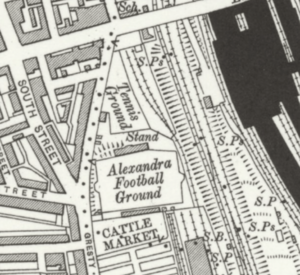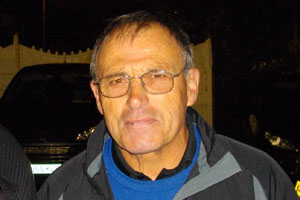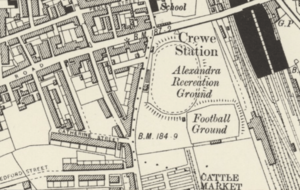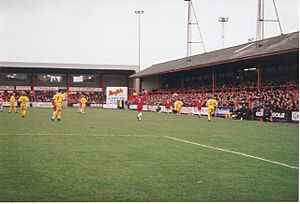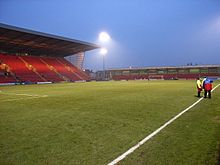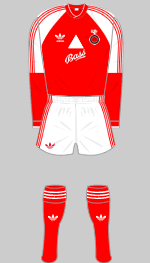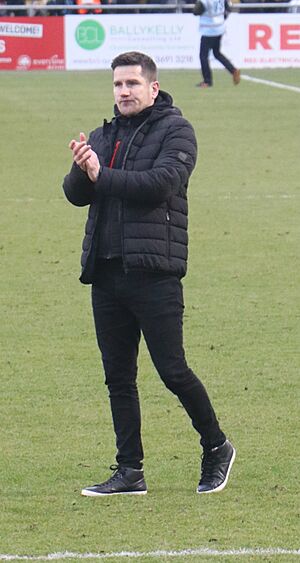Crewe Alexandra F.C. facts for kids
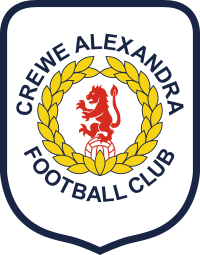 |
|||
| Full name | Crewe Alexandra Football Club | ||
|---|---|---|---|
| Nickname(s) | The Railwaymen, The Alex | ||
| Founded | 1877 (as Crewe) | ||
| Ground | Gresty Road | ||
| Capacity | 10,153 | ||
| Chairman | Charles Grant | ||
| Manager | Lee Bell | ||
| League | League Two | ||
| 2018–19 | League Two, 12th of 24 | ||
|
|
|||
Crewe Alexandra Football Club is a professional football team from Crewe, Cheshire, England. They are known as 'The Railwaymen' because Crewe is famous for its railway history. People also call them 'The Alex'. The team plays in League Two, which is the fourth level of English football. They have played at their home ground, Gresty Road, since 1906. Their biggest rivals are Port Vale.
The club started in 1877 as part of the Crewe Alexandra Cricket Club. They were named after Princess Alexandra. Crewe reached the FA Cup semi-finals in 1888. In 1892, they were one of the first teams in the Football League Second Division. They joined the new Football League Third Division North in 1921 and stayed there for 37 years. In 1958, they moved to the new Fourth Division.
Crewe got their first promotion in 1962–63 by finishing third. They were relegated the next season but promoted again in 1967–68. However, they only stayed in the Third Division for one season.
The team struggled in the fourth tier for 20 years. Then, Dario Gradi became manager in 1983 and led the club for 24 years. Under him, Crewe was promoted to the third tier twice. In 1997, they won the Second Division play-off final and reached the Football League First Division. This was their highest level in 101 years! This league was later renamed the Championship in 2004. Crewe played at this level for eight of the next nine seasons.
Dario Gradi was known for encouraging a fun, technical style of football. He also helped many young players become stars. Future England players like David Platt, Danny Murphy, Seth Johnson, and Dean Ashton all started at Crewe.
After dropping back to the fourth tier in 2009, Steve Davis helped the club get promoted to the third tier in 2012 through the play-offs. In 2013, Crewe won their first and only Football League Trophy. Under David Artell, who became manager in 2017, Crewe returned to League One in 2020. They finished 12th in the 2020–21 season, which was a great achievement. However, they were relegated again in 2022.
Lee Bell became manager in November 2022. He led the team to 13th place in the 2022–23 season and then to 6th place in the following season. They reached the play-off final but lost to Crawley Town at Wembley. In the 2024–25 season, Crewe aimed for promotion but finished 13th.
Contents
Club History
How Crewe Alexandra Started
Crewe Alexandra Football Club was formed in 1877. It began as a part of the Crewe Alexandra Cricket Club, which was started by workers from the Crewe locomotive works. The football club was named after Princess Alexandra. Their first game was on December 1, 1877, against a team from Basford, and it ended in a 1–1 draw.
In 1883, Crewe Alexandra played their first FA Cup match against a Scottish club called Queen's Park and lost 10–0. In February 1886, William Bell became the first Crewe player to play for his country, representing Wales. In 1887–88, the club made it to the FA Cup semi-finals before being knocked out by Preston North End.
In 1891, the football club became separate from the cricket club. On March 5, 1892, John Pearson became the first and only Crewe player to play for the England senior team while still playing for the club.
Crewe was a founding member of the Football League Second Division in 1892. However, they lost their league status in 1896 after four seasons. The club moved to the first Gresty Road ground in 1897. In 1906, their current stadium, also called Gresty Road, was built next to the old one.
Crewe rejoined the Football League in 1921. They finished 6th in their first two seasons in the Third Division North. Crewe's first major trophies were the Welsh Cup wins in 1936 and 1937. Even though Crewe is in England, English clubs from border areas were sometimes invited to play in the Welsh Cup. Bert Swindells scored 128 League goals for the club, which is still a record.
After World War II
From the 1950s to the early 1980s, Crewe had limited success. They often finished at the bottom of the Fourth Division. Between 1894 and 1982, Crewe finished last in the Football League eight times, more than any other club.
In 1960, Crewe played against Tottenham Hotspur in the FA Cup. A record crowd of 20,000 people watched the game at Gresty Road, which ended in a 2–2 draw. In the replay, Tottenham won 13–2, which is Crewe's biggest defeat ever. However, the next year, Crewe beat another top team, Chelsea, 2–1 in the FA Cup.
Promotions and Relegations in the 1960s
In 1963, Crewe was promoted to the Third Division for the first time. They won their final game against Exeter City with Frank Lord scoring the winning goal. The club finished third. However, they were relegated back to Division Four the next season. In the 1964–65 season, Terry Harkin set a new record of 34 league goals for Crewe. The club was promoted again in 1967–68 but only stayed in the Third Division for one season.
1970s and Early 1980s
From 1969, Crewe spent 20 years in Division Four. They finished last in 1971–72, 1978–79, and 1981–82. In 1977, Tommy Lowry played his 475th and last game for Crewe, setting a club record for appearances. In December 1979, manager Tony Waddington signed goalkeeper Bruce Grobbelaar, who later became famous playing for Liverpool.
The Gradi Era (1983–2011)
In June 1983, Dario Gradi became manager. He focused on building a youth academy to develop young players. These players could then be sold to help fund the club. Early successes included Geoff Thomas and John Pemberton. David Platt, who later played for England, was signed in 1985 and sold for £200,000 in 1988.
Under Gradi, Crewe became known for playing attractive, technical football and for developing young talent. Steve Walters became Crewe's youngest player at 16 years and 119 days old in 1988. In 1989, Crewe won their third promotion, moving into the Third Division.
Crewe was relegated in 1991. However, they continued to sell talented players like Rob Jones (to Liverpool for £300,000) and Craig Hignett (for a club record £500,000 to Middlesbrough). The club reached the 1993 Third Division play-off final but lost. Crewe then gained promotion in 1994. In the same year, Neil Lennon became the first Crewe player to play for his country since 1932, representing Northern Ireland.
Crewe lost in play-off semi-finals twice before returning to Wembley in the 1997 Division Two play-off final. They won 1–0 against Brentford, putting the club back in the second tier for the first time since 1896.
Staying in the Second Tier
Crewe achieved their highest league position, 11th, in the 1997–98 First Division season. Gradi kept the team in this division until 2002. Selling players like Lennon (for £750,000), Danny Murphy (for £1.5m), and Seth Johnson (for £3m) helped the club financially. Gradi celebrated his 1,000th game in charge of Crewe in 2001.
After one season in the Division Two, the team was promoted back to Division One at the end of the 2002–03 season. They finished second, which was Crewe's first runner-up position. Rob Hulse scored 22 league goals and was named in the PFA Team of the Year.
Crewe stayed in Division One in the 2003–04 season. At the start of the 2004–05 season, the league was renamed the 'Championship'. Crewe played well at first, but after selling Dean Ashton for £3 million in January 2005, they struggled. They avoided relegation on the final day by winning 2–1. However, they were relegated to League One the next season.
Changes in Management
By 2007, Gradi was the longest-serving manager in English football. He took on a new role as the club's technical director, and Steve Holland became the first-team coach. Holland's first season was tough, and the club barely avoided relegation. In November 2008, Holland was sacked, and Gradi became caretaker manager again.
In December 2008, Gudjon Thordarson was appointed manager. He had a good start and won the February 2009 Manager of the Month award. But the team had a poor end to the season and was relegated to League Two. In October 2009, Thordarson was sacked, and Gradi was again reinstated as caretaker manager. In November 2011, Gradi finally stepped down as manager to focus on youth development.
From 2011 to Today
Steve Davis became manager in November 2011. He led the team on a 16-match unbeaten run in early 2012, earning them a play-off spot. Crewe beat Southend United in the semi-final and then won the play-off final 2–0 against Cheltenham Town at Wembley. The goals were scored by academy graduates Nick Powell and Byron Moore.
Before the 2012–13 season, Crewe sold Powell to Manchester United and captain Ashley Westwood to Aston Villa. However, new academy players stepped up. Crewe returned to Wembley to win the Football League Trophy, beating Southend United 2–0 in the final in April 2013.
In March 2014, John Bowler, Crewe chairman since 1988, received an award for his contribution to league football. Dario Gradi had won the same award in 2011.
Crewe stayed in League One in the 2013–14 season. However, the 2015–16 season started poorly, and Crewe was relegated to League Two with five games left. In January 2017, Steve Davis was sacked.
Former Crewe player David Artell replaced Davis. Artell continued to bring young players from the academy into the first team. Crewe improved to 15th place in the 2017–18 season.
After 36 years with the club, Dario Gradi retired in October 2019. In February 2020, new changes to the club's board were announced. The Railwaymen Supporters Society also raised money to get a fan representative on the board.
On the pitch, Artell's team did very well in the 2019–20 season. They were at the top of the table when the season was stopped due to the COVID-19 pandemic. In June, Crewe's promotion to League One was confirmed. Artell was named League Two Manager of the Year, and two academy graduates, Perry Ng and Charlie Kirk, were named in the PFA League Two Team of the Year. Crewe finished 12th in League One in the 2020–21 season, their highest finish since 2006.
However, the next season was very difficult. The club was relegated with four games still to play in April 2022. Two days later, Crewe parted ways with Artell. Alex Morris became interim manager and then permanent manager. But in November 2022, Morris stepped down for family reasons. Lee Bell became interim manager and then permanent manager in December 2022.
Bell led the team to 13th place in the 2022–23 season. They improved to 6th place in the following season and reached the play-off final but lost. In the 2024–25 season, Crewe was in the automatic promotion places until January but finished 13th again.
Stadiums
Alexandra Recreation Ground
Until 1896, Crewe played at the Alexandra Recreation Ground, which was north of the current Gresty Road stadium. After playing at different places in 1896 and 1897, they returned to the same area to play at the first Gresty Road ground. In 1906, this ground was taken down to make way for new railway lines, and the current Gresty Road stadium was built nearby.
Gresty Road
The pitch at Gresty Road runs from east to west. The main stand has always been on the south side. Before the 1990s, the main stand was made of wood and had the only seats, plus a standing area called 'The Paddock'. The other three sides were standing terraces. This setup allowed for the club's record attendance of 20,000 people in 1960.
In the 1990s, the stadium was modernized. The "Railway End" was replaced by a new family stand in 1993. The "Gresty Road End" became an all-seater stand in 1995. The northern stand, called the "Pop Side," was replaced by an all-seater stand in 1996–97. In 2000, a new £5.2 million main stand was built.
Today, away fans sit in the stand along the northern side. The Gresty Road End and main stand are for home supporters. The stadium became all-seater in 2000. The record attendance in the all-seater stadium was 10,092 when Crewe played Manchester City in 2002.
In June 2021, the club agreed to a deal with its sponsor, Mornflake, to rename the ground the "Mornflake Stadium." This deal was extended in December 2023 and again in April 2025. The stadium is also known as the Alexandra Stadium and has seats for 10,153 people. It has four stands:
- The "Boughey Stand" (main stand) seats 6,809 people and has club offices and changing rooms.
- The "KPI Recruiting Stand" (Gresty Road End) seats 982 spectators.
- "The Andrew Connolly Financial Planning Stand" (Railway End) seats 682 spectators.
- The "Whitby Morrison Ice Cream Van Stand" (formerly the "Pop Side") seats 1,680 away fans.
In February 2023, the club announced plans to install 3,000 solar panels in the car park to power the stadium.
Club Identity
Since the late 1890s, Crewe's home kit has mostly been a red top with white shorts and red socks. They used to play in white shirts and blue shorts from 1886 to 1896. The red shirts earned them the early nickname "Robins." The club is now more commonly called "The Alex" or "The Railwaymen," reflecting its strong ties to the railway industry.
Crewe's away kit colors have changed over time. Blue, white, or blue-and-white shirts have been common. In the 21st century, they have also played in other colors, like black with gold trim or light and dark blue stripes.
The town's crest appeared on the team's shirts in the 1958–59 season. This crest included a lion, a cogged wheel, a larger railway wheel, and two wheatsheaves. In 1975, a simpler badge with a lion holding a railway wheel was used. The current badge, adopted in 1998, features a lion on a football, surrounded by a laurel and the club's name. Some fans miss the railway wheel from the old badge. The club's mascot is also a lion, named Gresty the Lion.
The cereals supplier Mornflake has been the main shirt sponsor since 2005, making it the longest continuous sponsorship in the EFL. In April 2025, Whitby Morrison became the club's new shirt sponsor, while Mornflake extended its stadium naming rights.
Supporters and Rivalries
Attendances
Crewe is the third largest town in Cheshire. Many supporters came from the railway works and nearby areas. The club's location next to Crewe railway station makes it easy for fans to travel to games.
From the 1920s to the 1960s, attendances usually averaged around 6,000. Local derby games could attract much larger crowds, like 15,102 for Stoke City in 1926, and a record 17,883 for Port Vale in 1953. Cup matches against big clubs also drew large crowds, like 20,000 in 1960.
However, league attendances dropped in the 1970s and 1980s, sometimes falling below 2,000. The lowest was 1,817 in 1986-87. Crewe's success under Gradi in the mid-1980s boosted interest, with attendances often over 5,000. Average attendance peaked at 7,741 in 2004 during Crewe's time in the Championship. Before the COVID-19 pandemic in 2020, League Two crowds averaged 4,580.
Ticket prices at Gresty Road are similar to other clubs. For the 2021–2022 season in League One, matchday tickets cost up to £25.
Rivalries
Crewe's main rivals are Port Vale. As of November 2024, they have played 84 games. Port Vale has won more games (40) than Crewe (20), with 24 draws. This rivalry, sometimes called the A500 Derby, became more intense after 2000. A 2019 study ranked it as the 14th biggest rivalry in English professional football.
Crewe also has smaller rivalries with Wrexham, Salford City, Shrewsbury Town, Stoke City, and other local Cheshire teams like Macclesfield, Chester City, Stockport County, and Tranmere Rovers.
Songs and Music
Crewe fans were the first to sing the song "Blue Moon" (also sung by Manchester City fans). It's said to reflect the tough times in the 1950s and 1960s, or a joke that the team only wins 'once in a blue moon'. The Crewe-based music group Dario G was named after Dario Gradi.
Railwaymen Supporters Society
Crewe supporters often sing "We are the Railwaymen." The independent Railwaymen Supporters Society was formed in 2018. They launched a campaign called Project250 to raise £250,000 to invest in club shares and get a fan representative on the board, which they achieved in February 2020.
Club Reputation
Developing Players
Crewe has a strong reputation for developing young players. In the late 19th century, several Crewe players played for their countries, especially Wales. In the 20th century, some players started their careers at Crewe before becoming famous elsewhere. For example, Frank Blunstone played for Crewe before moving to Chelsea and playing for England. Stan Bowles and goalkeeper Bruce Grobbelaar also started at Crewe before moving to bigger clubs.
Crewe's focus on young players began in the late 1980s. Manager Dario Gradi and chairman John Bowler helped create a youth coaching facility. By the early 1990s, 120 young players were being coached every week. In 1995, Crewe leased a 20-acre site for a training and player development facility, funded by selling players. By 2015, player sales had generated over £20 million, which helped modernize Gresty Road and develop Crewe's Academy. In 2022, it was ranked among the top 10 academies in England and Wales.
Players who came through the academy include England internationals Geoff Thomas and David Platt, Wales international Robbie Savage, and Northern Ireland's Neil Lennon. The academy also developed its own trainees, most notably England internationals Rob Jones, Danny Murphy, Seth Johnson, and Dean Ashton.
Club Records
Crewe's biggest league victory was 8–0 against Rotherham United in 1932. In the FA Cup, their biggest win was 9–1 over Northwich Victoria in 1889. The club's heaviest defeat was 13–2 against Tottenham Hotspur in the FA Cup in 1960. In the league, Crewe's worst defeat was 11–1 at Lincoln City in 1951.
Tommy Lowry has made the most appearances for Crewe: 482 games between 1965 and 1977. Bert Swindells holds the record for most goals for Crewe: 128 goals from 1927 to 1937. Terry Harkin scored the most goals in a single season: 34 in 1964–65.
William Bell was the first Crewe player to play for his country, representing Wales in 1886. Clayton Ince, with 31 caps for Trinidad and Tobago, has won the most international caps while playing for Crewe. Efe Sodje is the only Crewe player to play in a World Cup Finals tournament, for Nigeria in 2002.
Crewe's most expensive player signed was Rodney Jack, for £650,000 in 1998. Crewe received £3 million for Nick Powell when he moved to Manchester United in 2012. They also received £3 million for Seth Johnson's move to Derby County in 1999 and for Dean Ashton's move to Norwich City in 2005.
Players
Current Squad
|
|
Famous Former Players
In 2004, the BBC's Football Focus asked fans to vote for their favorite "cult hero." For Crewe, Seth Johnson won with 59% of the votes. Danny Murphy came second, and Craig Hignett was third.
Players Who Played for Their Country
William Bell was the first Crewe player to play for his country, representing Wales in 1886. On March 15, 1890, three Crewe players – Alfred Davies, Dick Jones, and Billy Lewis – played for Wales against England. Lewis scored Wales's goal, which was the first international goal scored by a Crewe player.
John 'Jackie' Pearson became the first Crewe player to play for England in 1892. He is still the only Crewe player to have played for the full England team while at the club. Donervon Daniels was the most recent Crewe player to play for his country, representing Montserrat in 2021.
| Player | Country | Caps | Goals | Years of caps | Notes | |
| Clayton Ince | Trinidad and Tobago | 36 | 0 | 1999–2005 | ||
| Steve Jones | Northern Ireland | 22 | 1 | 2003–2006 | ||
| Marcus Haber | Canada | 13 | 1 | 2014–2016 | ||
| David Vaughan | Wales | 13 | 0 | 2003–2007 | ||
| Efe Sodje | Nigeria | 8 | 1 | 2000–2003 | ||
| Rodney Jack | Saint Vincent and the Grenadines | 6 | 4 | 2000 | ||
| Neil Lennon | Northern Ireland | 6 | 0 | 1994–1995 | ||
| Billy Lewis | Wales | 6 | 1 | 1890–1892 | ||
| Michael O'Connor | Northern Ireland | 6 | 0 | 2008–2009 | ||
| William Bell | Wales | 3 | 0 | 1886 | ||
| Colin Murdock | Northern Ireland | 3 | 0 | 2005 | ||
| Robbie Savage | Wales | 3 | 0 | 1995–1996 | ||
| Mathias Pogba | Guinea | 2 | 0 | 2013 | ||
| Trevor Owen | Wales | 2 | 0 | 1893 | ||
| Edwin Williams | Wales | 2 | 0 | 1893 | ||
| Madjid Bougherra | Algeria | 1 | 0 | 2006 | ||
| Donervon Daniels | Montserrat | 1 | 0 | 2021 | ||
| Alfred Davies | Wales | 1 | 0 | 1890 | ||
| Dick Jones | Wales | 1 | 0 | 1890 | ||
| Fred Keenor | Wales | 1 | 0 | 1932 | ||
| Jamie Knight-Lebel | Canada | 1 | 0 | 2024 | ||
| Ben Lewis | Wales | 1 | 1 | 1892 | ||
| John Pearson | England | 1 | 0 | 1892 | ||
| Robert Roberts | Wales | 1 | 0 | 1893 |
Management
Managerial History
Since 1892, 29 different people have managed Crewe. Dario Gradi holds the record for managing the most games: 1,359 first team matches. Two Crewe managers, Gradi and Harry Catterick, have been added to the English Football Hall of Fame.
As of 2 June 2025. Only competitive matches are counted.
| Name | Nat | From | To | Record | |||||
|---|---|---|---|---|---|---|---|---|---|
| P | W | D | L | Win % | |||||
| W.C. McNeill1 | August 1892 | May 1894 | 50 | 12 | 10 | 28 | 24.00 | ||
| J.G. Hall1 | August 1895 | May 1896 | 31 | 5 | 3 | 23 | 16.13 | ||
| Robert Roberts1 | January 1897 | December 1897 | 0 | 0 | 0 | 0 | — | ||
| John Blomerley2 | January 1898 | May 1925 | 169 | 56 | 44 | 69 | 33.14 | ||
| Tom Bailey | August 1925 | May 1938 | 578 | 223 | 113 | 242 | 38.58 | ||
| George Lillycrop | August 1938 | July 1944 | 45 | 20 | 7 | 18 | 44.44 | ||
| Frank Hill | July 1944 | October 1948 | 102 | 45 | 19 | 38 | 44.12 | ||
| Arthur Turner | October 1948 | December 1951 | 149 | 56 | 39 | 54 | 37.58 | ||
| Harry Catterick | December 1951 | June 1953 | 74 | 31 | 11 | 32 | 41.89 | ||
| Ralph Ward | June 1953 | May 1955 | 96 | 25 | 28 | 43 | 26.04 | ||
| Maurice Lindley | August 1955 | May 1958 | 143 | 23 | 28 | 92 | 16.08 | ||
| Harry Ware | August 1958 | May 1960 | 100 | 36 | 22 | 42 | 36.00 | ||
| Jimmy McGuigan | June 1960 | November 1964 | 222 | 87 | 85 | 50 | 39.19 | ||
| Ernie Tagg | November 1964 | October 1970 | 273 | 105 | 69 | 99 | 38.46 | ||
| Tom McAnearney | October 1970 | July 1971 | 39 | 15 | 9 | 15 | 38.46 | ||
| Dennis Viollet | August 1971 | November 1971 | 15 | 4 | 2 | 9 | 26.67 | ||
| Jimmy Melia | May 1972 | December 1973 | 70 | 16 | 23 | 31 | 22.86 | ||
| Ernie Tagg | January 1974 | December 1974 | 48 | 13 | 12 | 23 | 27.08 | ||
| Harry Gregg | January 1975 | May 1978 | 163 | 53 | 53 | 57 | 32.52 | ||
| Warwick Rimmer | August 1978 | May 1979 | 46 | 6 | 14 | 26 | 13.04 | ||
| Tony Waddington | June 1979 | July 1981 | 93 | 24 | 27 | 42 | 25.81 | ||
| Arfon Griffiths | August 1981 | October 1982 | 59 | 9 | 10 | 40 | 15.25 | ||
| Peter Morris | November 1982 | June 1983 | 33 | 8 | 7 | 18 | 24.24 | ||
| Dario Gradi3 | June 1983 | July 2007 | 1,241 | 464 | 476 | 301 | 37.39 | ||
| Dario Gradi4 / Steve Holland5 | July 2007 | November 2008 | 72 | 19 | 16 | 37 | 26.39 | ||
| Dario Gradi6 | November 2008 | December 2008 | 8 | 3 | 1 | 4 | 37.50 | ||
| Gudjon Thordarson | December 2008 | October 2009 | 37 | 12 | 7 | 18 | 32.43 | ||
| Dario Gradi6 | October 2009 | November 2011 | 110 | 38 | 23 | 49 | 34.55 | ||
| Steve Davis | November 2011 | January 2017 | 272 | 84 | 71 | 117 | 30.88 | ||
| David Artell | January 2017 | April 2022 | 274 | 100 | 51 | 123 | 36.50 | ||
| Alex Morris | April 2022 | November 2022 | 24 | 5 | 9 | 10 | 20.83 | ||
| Lee Bell | November 2022 | present | 141 | 50 | 43 | 48 | 35.46 | ||
1As secretary-manager
2John Blomerley was secretary-manager until 1911; honorary secretary until 1925
3As sole manager. Assistant manager Neil Baker took charge for a short period in 2003.
4As technical director
5As first team coach
6As caretaker manager
Coaching Positions
| Name | Nationality | Role |
|---|---|---|
| Lee Bell | Manager | |
| Ryan Dicker | Assistant manager | |
| Fred Barber | Goalkeeping coach | |
| Michael Jackson | U23 manager | |
| Kenny Lunt | Player development manager | |
| David Vaughan | U18 manager | |
| Sam Pettit | U18 assistant manager | |
| Aidan Callan | Academy manager | |
| Josh Kennard | Head of recruitment |
Honours and Achievements
League
- Second Division (level 3)
- 2nd place promotion: 2002–03
- Play-off winners: 1997
- Fourth Division / Third Division / League Two (level 4)
- 2nd place promotion: 2019–20
- 3rd place promotion: 1962–63, 1993–94
- 4th place promotion: 1967–68, 1988–89
- Play-off winners: 2012
Cup
- Football League Trophy
- Winners: 2012–13
- Welsh Cup
- Winners: 1935–36, 1936–37
Crewe Alexandra has never won a division title, but they have finished as runners-up twice. Besides winning play-offs, they have also been promoted four times from the fourth tier by finishing third or fourth. Crewe's highest league position was 11th in the second tier, the First Division in 1997–98.
In major cup competitions, Crewe reached the semi-finals of the FA Cup in 1888. They have reached the third round of the League Cup ten times. They won the Welsh Cup twice, in 1936 and 1937, even though Crewe is in England. They have also won the Cheshire Senior Cup 22 times, most recently in 2017.
See also
 In Spanish: Crewe Alexandra Football Club para niños
In Spanish: Crewe Alexandra Football Club para niños
 | Delilah Pierce |
 | Gordon Parks |
 | Augusta Savage |
 | Charles Ethan Porter |


